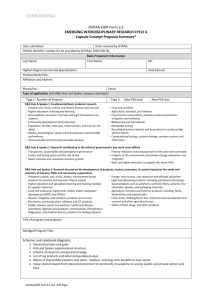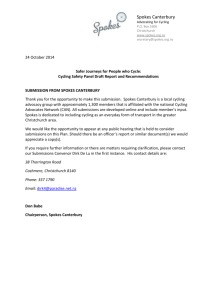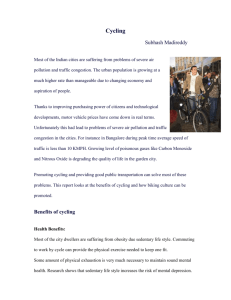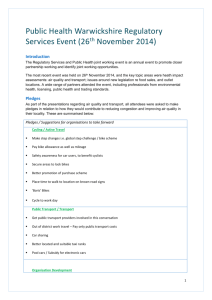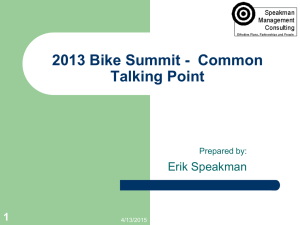nzta_cycle_safety_panel_d2
advertisement
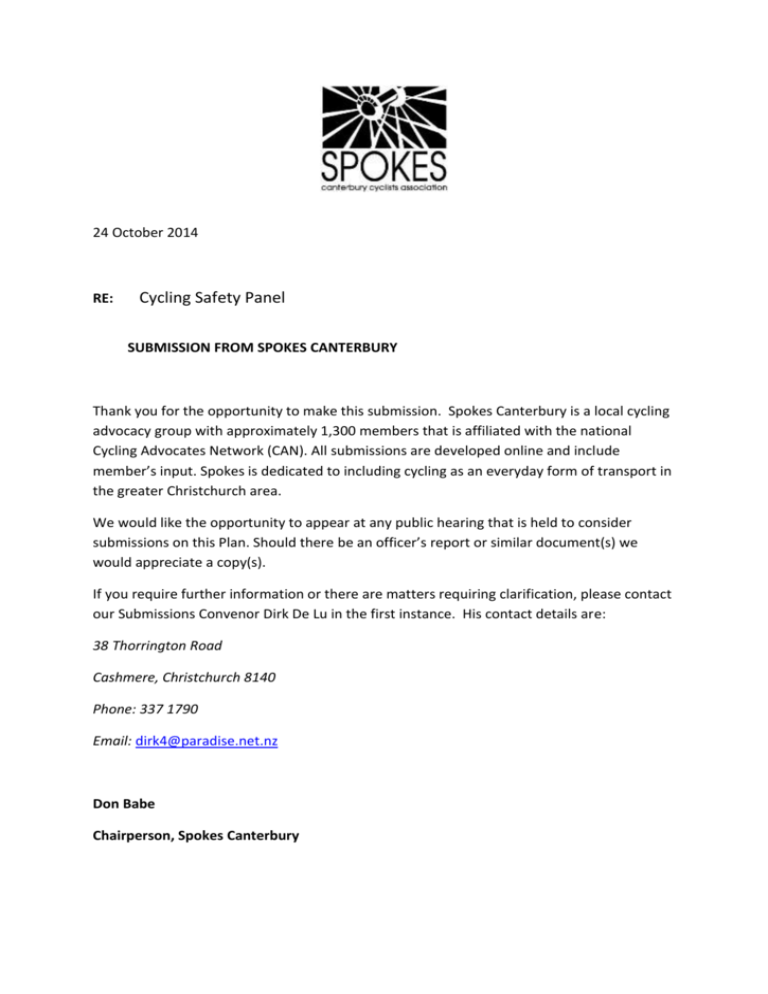
24 October 2014 RE: Cycling Safety Panel SUBMISSION FROM SPOKES CANTERBURY Thank you for the opportunity to make this submission. Spokes Canterbury is a local cycling advocacy group with approximately 1,300 members that is affiliated with the national Cycling Advocates Network (CAN). All submissions are developed online and include member’s input. Spokes is dedicated to including cycling as an everyday form of transport in the greater Christchurch area. We would like the opportunity to appear at any public hearing that is held to consider submissions on this Plan. Should there be an officer’s report or similar document(s) we would appreciate a copy(s). If you require further information or there are matters requiring clarification, please contact our Submissions Convenor Dirk De Lu in the first instance. His contact details are: 38 Thorrington Road Cashmere, Christchurch 8140 Phone: 337 1790 Email: dirk4@paradise.net.nz Don Babe Chairperson, Spokes Canterbury Submission from Spokes Canterbury Spokes Canterbury is extremely impressed by this report and the panel is to be complimented in all regards. Our representatives to the citizen’s advisory panel were fortunate to interact with the panel members and uniformly pleased with the experience. It was a real pleasure to work with such a well-run and focused effort which wasted no time and produced a document worthy of the important issues addressed. Spokes is in support of all actions and encourages the panel to make the language clear in stating that these actions must be fully adopted and implemented if the goal of safe roads for all is to be achieved. The suggested measure of success, a reduction in the death and serious injury (DSI) rate per million kilometres cycled is a good starting point. Please consider adding to this wording to the effect that uptake of cycling, cycle kilometres travelled, increases significantly and in a timely manner. So long as investigations find that many people want to cycle but fear doing so the government is failing in meeting their needs. Specific Actions “1. Planning and Investment - safe provision for active modes is considered at all stages of road transport planning and investment” Support for all Actions. To the actions offered Spokes asks that the Panel add: Local bodies, Road Controlling Authorities(RCA) must be included if improvements are to be achieved. Benchmarking of cycling provision needs to be mandatory. Key Performance Indicators(KPI) for cycling and safety need to be meaningful and required for funding. Designs need to be audited for compliance. The current approach underserves the poor and minorities leaving them with poor transport provision and greater injury risk. Specify in ii the benefits to be included ie; public health, congestions and pollution reduction, positive impact on balance of trade, etc. Mandate meaningful early involvement of cyclists/cycle advocacy groups at all levels of government in planning and projects, including land use planning. Increase funding for cycling to support goals of 10-20% of trips by cycle. The current funding levels are grossly inadequate while over allocating for far lesser value for money big roading projects. Redraft the Transport GPS in alignment with future needs and best practice. See Spokes sub on the GPS for details. “2. Leadership and Accountability - establish strong leadership and accountability practices for safe cycling” Support for all Actions. To the actions Spokes asks that the Panel add: Current practice is to allow drivers to escape responsibility for their actions resulting in serious injury or death to cyclists and failure to enforce even basic road code rules in many instances. The culture of car is king is dominant in how people use the roads and accepted as simply ‘the way things work’. In large part this road culture and the lack of proper infrastructure creates chaotic and unacceptable interactions with all road users too often ignoring the road code. Cyclists may find that they do so simply to survive, mounting the footpath, passing on the inside of intersections to be at the head of the queue, etc. An attitude of ‘every one for themselves’ is the logical outcome when the rule of law in support of the public good is drafted without recognition of all road users and applied inconsistently. It is sincerely hoped that this panel’s report will make large strides in changing what has been a system delivering unacceptable outcomes for decades. Mutual respect is furthered when road users have faith that unacceptable behaviour will not be tolerated. Legal consequences for unacceptable and/or illegal behaviour must be fit for purpose. Adopting the premise that motorists must be proven innocent in collisions with nonmotorised road users is a first step to overcoming the sense of superiority currently ingrained by practice and too often supported by authorities. Cyclists too must be held accountable with consequences commensurate with the threat posed to other road users and themselves from unacceptable behaviour. Safe leadership and accountability must include all involved, including enforcement. Infrastructure and improved skills on their own will not be enough. “3. Information collection systems relating to cycling safety be improved and expanded” Support for all actions. “4. Minimise crash risk - RCAs take action to minimise conflict (crash risk) between people who cycle and other road users, especially heavy vehicles” Support for all actions. Spokes appreciates the Panel pointing out the outdated and unsafe design practices furthered by Austroads and the recommendation that best practice European standards which recognize the vulnerability of and paramount concern for vulnerable road user’s safety be considered. Spokes asks that New Zealand call for Austroads to be amended in alignment with international best practices and that these approaches be implemented during the Austroads updating period. Item ix concerning cyclist safety at road construction should definitely be made high priority. “5. Road Controlling Authorities provide safe on-road connections to the NZ Cycle Trail and other nationally significant cycle trails” Support for all actions. “6. Manage Motor Vehicle Speed – to minimise crash risk and severity” Support for all actions. “7. Minimum passing distances – mandated via the Land Transport Act and Regulations” Support for all actions. “8. School Travel Plans and Cycle Skills Training – increased support from the Transport Agency and local government” Support for all actions. Please add the requirement for cycle skills training in all schools up to skill level ‘grade 3’. Even students who do not go on to cycle may have a better understanding of the needs of people who cycle and hence have better driving skills. “9. Road User Behaviour and Awareness – the Transport Agency to develop programmes to improve road user (both drivers and cyclists) behaviour and awareness” Support for all actions. Spokes sees Actions 8 and 9 as closely related. Combining the two may result in better outcomes. “10. Corporate responsibility - WorkSafe New Zealand and ACC and other stakeholders encourage corporate responsibility for employed drivers and contractors so that they practise safe behaviour towards cyclists” Support for all actions. See comments made on Action 2 which also apply here. “11. Legislative Review – the Ministry of Transport refresh its legislative review of provisions relating to cycling.” Support for the most part. Should a review take place a body such as this panel should be closely involved in the process from the outset. Spokes does not have an official position on the requiring of helmets. Spokes is aware that some people who might cycle may be put off cycling by this requirement. Requiring helmets also conveys the message that cycling is dangerous. Research has shown that occupants of motor vehicles would also be advantaged by wearing helmets. While it is unlikely that any government would mandate helmet use in cars the fact that it would be wise to do so should be as widely disseminated as the information on helmet requirements for cyclists. “12. Truck Side Under-run Protection - investigation of side under-run protection and other vehicle features to minimise the risk to cyclists from heavy vehicle crashes” Support and ask that consideration of the life altering consequences for victims and the cost to society in medical expense, lost productivity and full social costs of truck/bicycle collisions be fully included in the cost effectiveness of requiring safety equipment on trucks. “13. Bicycle Lights and E-Bikes – the Transport Agency adopt improved standards for bicycle lights and the European Union standard for e-bikes” Support for all actions. Spokes supports the Possible Performance Measures provided. Regarding all Suggested Actions Medium Priority Actions It is understood that the Panel is trying to take a balanced and realistic approach as to what can reasonably be achieved. With fundamental social change and transport mode choice priority being clearly implicit raising all of the medium actions to high may well be an honest approach. What is sought here is fundamental change. An incremental approach is traditional, but unlikely to achieve the safety goals in a reasonable time period. Thanks to all those involved in making this excellent report and recommendations.
